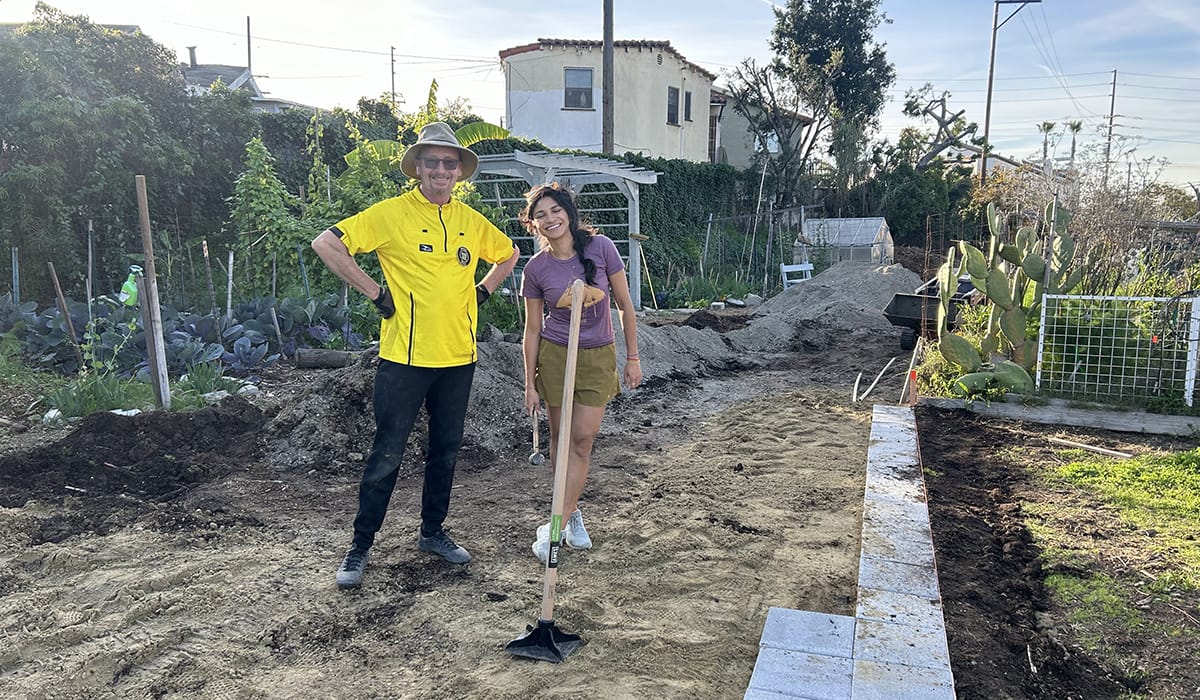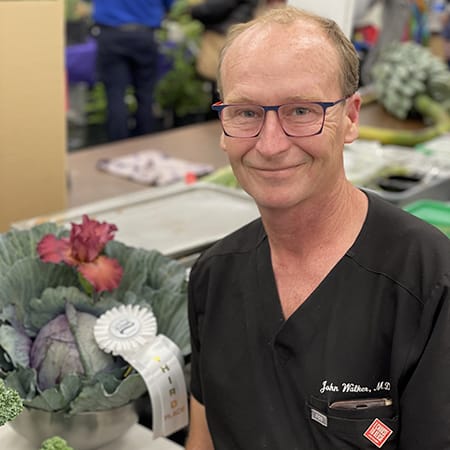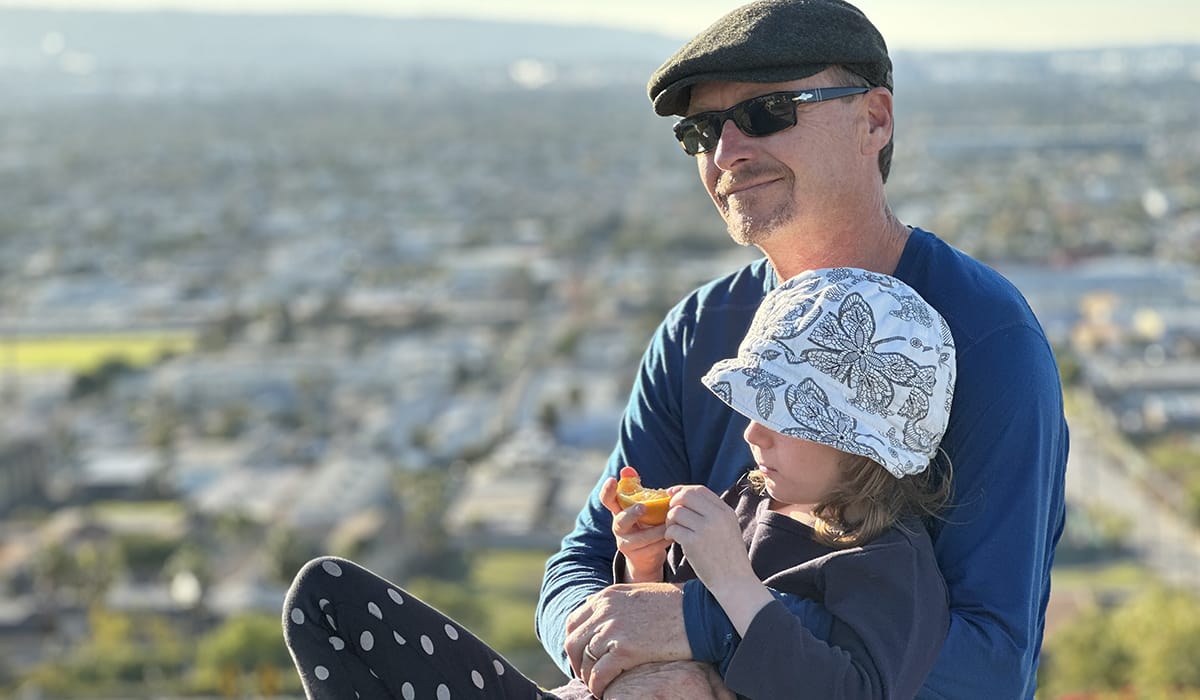Cultivating Growth and Nourishment in Long Beach Community Gardens

Meet Daily Point of Light Award honoree John Walker. Read his story, and nominate an outstanding volunteer or family as a Daily Point of Light.
Dr. John Walker M.D., a board member and volunteer at Long Beach Organic (LBO), has distinguished himself as an exemplary figure in the community, especially during the challenging times brought on by the pandemic. His dedication to transforming and expanding the Giving Gardens to combat food insecurity, alongside his innovative craftsmanship in woodworking, underscores a profound commitment to serving and enriching his community.
During a period when many programs were halted due to the pandemic, John played a pivotal role in shifting focus towards fighting food insecurity in partnership with the California State University at Long Beach’s Food Pantry. Under his guidance, the Giving Gardens flourished, providing over eight tons of greens, hearty vegetables and fruits, aiding over 300 students weekly.
John’s leadership extends beyond gardening to include the design and construction of garden structures and tools. His creation of ADA (Americans with Disabilities Act) accessible paths and gardening beds ensures that all community members can participate in and benefit from the gardens.
Read on to find out how John exemplifies the power of community volunteerism to make a tangible difference in the lives of many.

Tell us about your volunteer role.
I have been volunteering at the Long Beach Organic community garden for the last 12-plus years continually. Two years ago, I was nominated as an official board member, and it has been a rewarding experience volunteering in a group of people interested in the gardens.
Board member duties involve fundraising for the garden and ensuring a stable fiscal future to sustain our gardens, grow them and increase access to as many people as possible. ADA-compliant, all-access paths are being installed in our gardens. I personally spent 24 hours on this part of the project, which meant eight hours a day for Friday, Saturday and Sunday, building a 300-yard concrete paver pathway over a muddy garden area to ensure safe wheelchair access to our raised ADA garden beds.
The ADA pathway will be the sixth structure built to successful completion in Zaferia Garden alone, located at 10th and Grand in Long Beach. Other structures include several dozen redwood benches for the gardens, two 8×10 toolsheds, outside tables, plant storage areas, three arbors, two local clay pizza ovens anda memorial bench dedicated to our past treasurer who passed away and the giving garden at Zaferia where we grow the bulk of the 15,000 pounds of fresh, organic vegetables we donated over the last three years to the Cal State Long Beach food pantry for food insecure students.
As a physician, I am acutely aware of the need for micronutrients in diets, as well as whole foods and fiber. I am able to not only educate, but also help feed these students essential micronutrients to help them better remember their lessons. I think we do some pretty cool things in the garden, besides also providing a safe, encouraging, nurturing environment for many patrons who suffer from mental health illnesses like depression, anxiety, dementia and autism.
This is a real benefit to the community, providing “pressure relief” sites. Health benefits are expounded, shared, educated to all garden patrons, and if someone’s plot gets too weedy and unattended, we are concerned for those people. We reach out and try to support them.
It’s really all about the people, not really the gardens, but the organic vegetables and fruit sure are delicious and nutritious!
Why is this issue so important to you?
When nothing else brought me joy, the garden delivered. I would say it cleared my head and saved my life. I get so much satisfaction in being in the garden. Helping build it is where I meet God. It is an interaction that is so special, between making soil, composting and drawing down the carbon into the soil, taking it out of the CO2 cycle, enlivening the once dead dirt with fungi, bacteria and insects, as well as the multiple environmental benefits of a garden.
As Long Beach continues to strive for sustainability and resilience in the face of environmental challenges, it is crucial to recognize the significant role that community gardens can play in mitigating the impacts of urbanization. Specifically, in light of the recent extreme weather atmospheric river event, these green spaces offer a permeable solution to water runoff, promoting groundwater recharge and reducing the strain on our stormwater infrastructure.
Community gardens serve as more than just spaces for growing fruits and vegetables; they act as vital components of a city’s ecological infrastructure. By replacing impermeable surfaces with vegetation, such as native plants and food crops, these gardens facilitate the infiltration of rainwater into the soil, rather than allowing it to run off into storm drains and ultimately into our waterways.

One of the primary environmental benefits of community gardens is their ability to mitigate the effects of urban heat islands. By absorbing and evaporating water through transpiration, plants help cool the surrounding area, reducing temperatures and energy consumption. This natural cooling effect not only enhances the comfort of residents but also alleviates the strain on air conditioning systems, thereby lowering greenhouse gas emissions.
Furthermore, the presence of community gardens can improve air quality by capturing pollutants and releasing oxygen through photosynthesis. This is especially important in urban environments like Long Beach, where air pollution from vehicles and industrial activities can have detrimental effects on public health. By creating more green spaces throughout the city, we can contribute to cleaner air and a healthier population.
In addition to their environmental benefits, community gardens foster social cohesion and community resilience. They provide opportunities for residents to connect with nature, learn about sustainable gardening practices and build relationships with their neighbors. These shared spaces promote a sense of ownership and stewardship, empowering communities to take an active role in preserving their local environment.
What’s been the most rewarding part of your work?
Working with volunteer groups brings an enormous sense of group cohesiveness, and achievement so is probably one of the most rewarding. Working with younger children and youth and showing them what is possible in the garden is very rewarding too. Many kids I worked with to build structures had never used tools before, so getting them to use drills and building is very rewarding. Building and strengthening our community through outreach programs is very rewarding too. Helping to build strength and resilience into the organization and working towards ensuring its future for all is very important to me now.
Why is it important for people to get involved with the causes they care about?
People who want to see any change must get involved in the change we want to see. I think President Barack Obama drove that home, or at least it was a strong message during his presidency that filtered through strongly.
Any advice for people who want to start volunteering?
Just start. Get involved. Volunteer to make you feel better.
Do you want to make a difference in your community like John? Find local volunteer opportunities.
